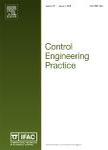版权所有:内蒙古大学图书馆 技术提供:维普资讯• 智图
内蒙古自治区呼和浩特市赛罕区大学西街235号 邮编: 010021

作者机构:Univ Canterbury Dept Mech Engn Christchurch 1 New Zealand Christchurch Hosp Dept Intens Care Med Christchurch New Zealand Univ Otago Christchurch Sch Med & Hlth Sci Dunedin New Zealand Univ Canterbury Dept Math & Stat Christchurch 1 New Zealand Univ Canterbury Dept Psychol Christchurch 1 New Zealand
出 版 物:《CONTROL ENGINEERING PRACTICE》 (Control Eng. Pract.)
年 卷 期:2005年第13卷第9期
页 面:1139-1149页
核心收录:
学科分类:0711[理学-系统科学] 0808[工学-电气工程] 07[理学] 08[工学] 070105[理学-运筹学与控制论] 081101[工学-控制理论与控制工程] 0811[工学-控制科学与工程] 0701[理学-数学] 071101[理学-系统理论]
基 金:Bright Futures Top Achiever Doctoral Scholarship Todd Foundation Foundation for Research, Science and Technology, FRST
主 题:biomedical control physiological models PD controllers non-linear dynamics patient agitation sedation administration
摘 要:Agitation in the critically ill damages patient health and increases length of stay and healthcare costs. The control model presented captures the essential dynamics of the agitation-sedation system, and is statistically validated using recorded infusion data for 37 patients. Derivative focused control is seen to provide an essentially bolus-driven management approach, which is shown to be an effective means of managing agitation, given consistent agitation measurement. Improved agitation management using feedback of patient agitation reduces the modelled mean and peak agitation levels 68.4% and 52.9% on average, respectively, illustrating the effectiveness of simple control in this non-linear system. (c) 2004 Elsevier Ltd. All rights reserved.